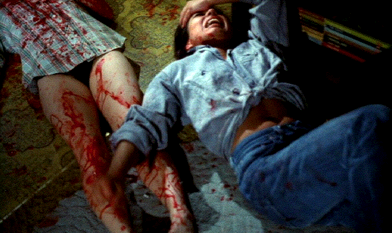Director: Dennis Donnelly
In an apartment house, three women are brutally murdered one night by an intruder using various tools from his toolbox as weapons. The following evening another woman is killed in her apartment, and teenager Laurie Ballard (Pamelyn Ferdin) from the apartment above is kidnapped. The police have no clues, so Laurie’s brother Joey (Nicholas Beauvy) begins following his own hunches about the mysterious assailant.
The Flashback Fanatic movie review
For many, this is a film that is hard to like and even harder to defend. I think this is due to the near absence of plot and the unrelenting and senseless brutality of its first act. Most of the violence occurs early on, and then we are left with very mundane characters coping with the aftermath. The cops can’t seem to find any real clues. The lead detective on the case is trying, but he is rather cynical and does not want any suggestions from the missing girl’s brother. The girl’s brother feels like he is a suspect. The girl’s mother is just trying to keep working to cope with the wait for news of her missing daughter. There are no heroes here and the story does not progress through a series of set pieces and stunts that are meant to thrill and entertain. Whether by accident or design, The Toolbox Murders has a real world feel that is often lost when films are planned to satisfy expectations.
Cameron Mitchell is the top-billed star and is supposed to have either improvised or added bits for his character in this film. He has stated that he did not care for gory films like many he would be appearing in late in his career, but he sure seems to be giving it his all here like a pro.
Aneta Corsaut gets back to her horror movie roots in The Toolbox Murders. She starred alongside Steve McQueen in The Blob (1958). She is probably most recognized for her long-running television role on The Andy Griffith Show; she’s come a long way from Mayberry. Corsaut plays the mother of the kidnapped girl Laurie and serves to drive home the point that there is emotional wreckage suffered by a victim’s loved ones. Most slasher films never deal with this aspect. It is not a plot point, but an emotional touchstone that helps establish this film’s own sense of discomfort.
My favorite performer is Tim Donnelly as Detective Lieutenant Mark Jamison. He seems like a guy just doing his job that has probably been soured by his work and is not some super sleuth that intuits grand insights into the killer and his crimes. He wants things to quickly make sense. His frustration is apparent when he is asking the missing girl’s brother Joey questions at the police station. He also commits one of the most socially uncomfortable acts in any horror film. When he is asking the missing girl’s mother questions, he also seems to be hinting at making a date with her. Lieutenant Jamison is one emotionally tone-deaf guy.
I think that the featured teenage actors (Pamelyn Ferdin, Nicholas Beauvy, and Wesley Eure) perform well. They come across as real rather than anything idealized to stroke the teen audience. Ferdin has the rather thankless task of being tied up and gagged for a good portion of the film, but she registers plenty of real emotion, even when she can’t speak or move.
Aside from Cameron Mitchell, probably the best remembered performance is by Marianne Walter. She went on to perform in adult films as Kelly Nichols and later became a make-up artist. Walter performs most of her role in the nude, and her scene is probably the film’s most notorious. It seems to be trying to hit both of the exploitation bases of sex and violence. But with its slow build of the sensual, to the voyeuristic, to the violent while a country love song sung by a male and female duo plays on the radio, it has a rather twisted and tragic perversity to it. This is going for something more than just being a down-and-dirty horror movie moment.
It should be noted that the murders that open this film are mostly “scored” with just the music playing on the stereos of the victims in their apartments. This lends the atrocities a mundane intimacy that draws us in and increases the discomfort. What happens is extreme but not stylized.
The overall tone in this film is very bleak. The bloody extermination of the victims is not presented as a spectacle but as an atrocity. The fact that nothing turns out in emotionally satisfying movie terms means we are experiencing something uncomfortable and uncompromising. That may not qualify as art, but if this film tried to be conventional plot-wise and gave us a pat ending, it would still face exactly the same criticism of being misogynistic.
The Toolbox Murders is not for the casual filmgoer deciding to check out a horror movie for a change of pace. It was intended to horrify in the most blunt and uncomfortable way possible. The closing caption claims that the story is based on actual events of 1967, though this does not appear to be true. As important as the violence in its everyday setting is to the movie’s impact is the odd structure of this story and its constant refusal to meet audience expectations.















No comments:
Post a Comment